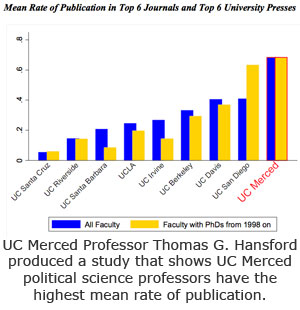

Political science professors at UC Merced, on average publish papers in leading journals and books with top university presses at the fastest rate in the system.
According to a study produced last fall by political science Professor Thomas G. Hansford, UC Merced faculty members have the highest mean rate of publication.
“We're fostering a culture of research first and research excellence,” Hansford said. “We're small but we're a very research-active faculty. It's something undergraduates interested in conducting research should take into account.”
One of the hallmarks of a UC Merced education is the opportunity for undergraduate and graduate students to conduct research alongside innovative faculty members in an interdisciplinary setting.
“The political science faculty here at UC Merced have really benefited from working closely with our colleagues in neighboring disciplines, such as cognitive science, economics, psychology and sociology,” Hansford said.
Hansford made a point to make the study as fair as possible, even including the fourth through sixth leading journals, which focus on comparative and international politics — subjects not studied by most the UC Merced political science faculty.
Hansford noted that the campus has recruited talented political science professors, including Jessica Trounstine, who came from Princeton, to help grow the program. It was thinking about each professor's output that spurred him into seeing how the group stacked up against other campuses.
“I'm surprised at how stark the results are,” he said.
In September, Hansford tallied the number of papers published by each UC campus in American Political Science Review, American Journal of Political Science, Journal of Politics, World Politics, International Organization and British Journal of Political Science. He combined that figure with the number of books they have published with university presses at Cambridge, Princeton, Oxford, Chicago, Yale and Harvard, and then calculated the average number of publications per year.
Hansford's study also includes an assessment of the output of faculty members who have received their Ph.D. after 1998, which is the case for UC Merced's political science professors, for a more equal comparison.
The main criticisms, he said, could be that the study itself doesn't take into account subjective rankings, graduate student training or job placement. Nevertheless, it reflects the tremendous output of quality research produced by UC Merced professors.






